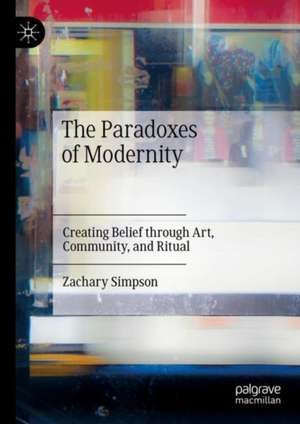The Paradoxes of Modernity: Creating Belief through Art, Community, and Ritual
Autor Zachary Simpsonen Limba Engleză Hardback – 11 mai 2022
How do we live out the values we know to be constructions? This question holds captiveour ability to solve public goods problems and make our lives more meaningful. Instead of seeing this paradox of modernity as self-deception or bad faith, Zachary Simpson employs cognitive and social scientific research to explain how best to realize values that we know to be false: through art, community, and ritual. In Simpson's account, the values we construct must conform to narrative, be reinforced through community, and habituated through ritual. And yet modernity has also undermined collectivity and ritual. Thus arises the second paradox of modernity: the best tools we have for realizing values are those which devalue the individual modern subject.
The last part of the book attempts to make three normative points regarding modernity. First, the modern, individualist subject is insufficient to realize the very values and aspirations of modernity. We must recognize that humans are collective and communal. Second, we cannot simply create values – they must arise in communities and be realized through narrative and ritual. And, third, if we are to live meaningful lives as contemporary meta-ethicists and positive psychologists argue, then such lives must include art, community, and ritual as a way to affirm and reinforce one’s values.
Let’s Pretend is a statement about one of the dilemmas of the contemporary western world and how that dilemma is, and might be, resolved. How do we believe in the values that we know will make a better world, even if they are of our own making? We must do so, in part, by becoming less modern, by engaging with one another and imagining more.
The book should serve as both an essay in the history of Western thought as well as a constructive argument about the nature of the modern epoch and what resources we have to realize the central aspirations of modernity. It aims to fill a critical lacuna in theoretical and philosophical approaches to modernity. While most texts focus on either the need for created values or the need to remedy modern subjectivity, few, if any, link the two problems together. Moreover, they do not ground their analyses in the social sciences and contemporary findings regarding the efficacy of narrative, communal action, and rituals.
The book is unique, then, because it asks a central question – how do we believe in what we know to be false? – and because it answers this question using interdisciplinary methods that allow us to see the faultlines and paradoxes of our age.
| Toate formatele și edițiile | Preț | Express |
|---|---|---|
| Paperback (1) | 692.74 lei 6-8 săpt. | |
| Springer International Publishing – 12 mai 2023 | 692.74 lei 6-8 săpt. | |
| Hardback (1) | 697.97 lei 6-8 săpt. | |
| Springer International Publishing – 11 mai 2022 | 697.97 lei 6-8 săpt. |
Preț: 697.97 lei
Preț vechi: 821.14 lei
-15% Nou
Puncte Express: 1047
Preț estimativ în valută:
133.56€ • 142.82$ • 111.36£
133.56€ • 142.82$ • 111.36£
Carte tipărită la comandă
Livrare economică 18 aprilie-02 mai
Preluare comenzi: 021 569.72.76
Specificații
ISBN-13: 9783030990558
ISBN-10: 3030990559
Pagini: 238
Ilustrații: IX, 238 p.
Dimensiuni: 148 x 210 mm
Greutate: 0.45 kg
Ediția:1st ed. 2022
Editura: Springer International Publishing
Colecția Palgrave Macmillan
Locul publicării:Cham, Switzerland
ISBN-10: 3030990559
Pagini: 238
Ilustrații: IX, 238 p.
Dimensiuni: 148 x 210 mm
Greutate: 0.45 kg
Ediția:1st ed. 2022
Editura: Springer International Publishing
Colecția Palgrave Macmillan
Locul publicării:Cham, Switzerland
Cuprins
Chapter 1: Introduction (with added material on modernity).- Chapter 2: Skepticism and Beyond.- Chapter 3: Noble Lies, Fantasies, and Fictions.- Chapter 4: The Religious Story.- Chapter 5: Modernity and the Temporal Shift.- Chapter 6: A Philosophy of Fictions.- Chapter 7: Art, Narrative, and Commitment.- Chapter 8: Community.- Chapter 9: Ritual.- Chapter 10: The Subject.- Chapter 11: Pretending Our Way to Fulfillment (with added section on myth).- Chapter 12: The Work of Mourning (with further elaboration on religion and myth).
Notă biografică
Zachary Simpson is Professor of Philosophy and Religious Studies at the University of Science and Arts of Oklahoma, USA.
Textul de pe ultima copertă
The Paradoxes of Modernity examines one of the central dilemmas of the modern world: How do we believe in ideas that we know to be untrue, but are of practical value? The modern world tells us to be critical and independent. And yet it also proliferates constructed ideas, from gods to ethical ideals to fictions. Using research from anthropology, psychology, religion, and philosophy, the book shows how the path to belief goes through narratives, communities, and rituals. These technologies help us realize belief in an age of unbelief, but they also call into question the central dogmas of modernity itself: the independent, critical, and rational subject. To be modern is to be caught between these two paradoxes: either incapable of believing in ideas we desire, or realizing them at the expense of modernity itself.
Caracteristici
Offers an interdisciplinary examination of a paradox that lies at the heart of modernity Serves as both an essay in the history of Western thought as well as a constructive argument Asks and answers many questions about our current existence
